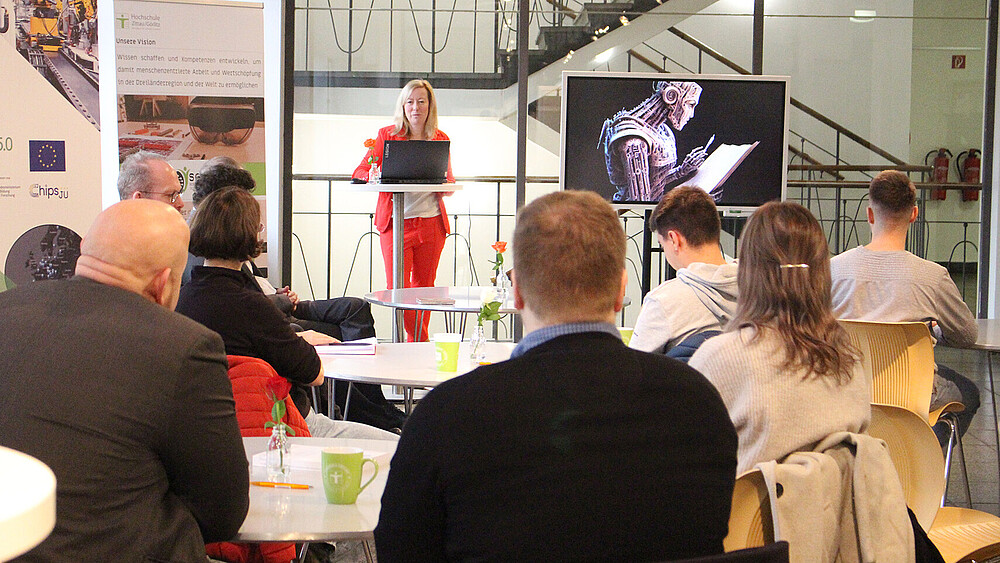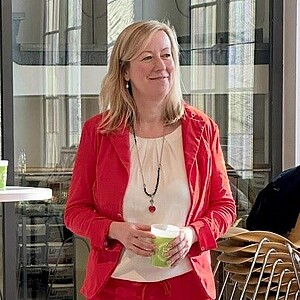When the GAT Institute visits the SCO-TTI research group, it provides interesting insights into the working world of tomorrow. A day dedicated to innovation, interdisciplinary exchange and collaboration.

At the second innovation forum of the SCO-TTi research team, the foyer of the Faculty of Business, Economics and Industrial Engineering was transformed into a lively meeting place for innovation and interdisciplinary exchange. Scientists from the GAT Institute and students from the part-time Master's degree program inSocial Gerontologymet with scientists from SCO-TTi and the IPM Institute for an inspiring exchange.
The event not only provided a platform to present the SCO-TTi group 's latest research findings, but also created an open space for stimulating conversations and discussions about possible avenues for future collaboration. The exchange of different perspectives from economics, social sciences, engineering, psychology and gerontology on the "future of work" in our society, which is characterized by digitalization and demographic change, was particularly valuable.
Prof. Hoff, Head of the Social Gerontology course and Director of the GAT Institute, expressly thanked Prof. Keil, the Dean Prof. Zips and the SCO-TTi team for this great event.
We are working together to optimize human-technology interaction so that users enjoy using technology and thus improve their lives. We can do this best together!
”The program offered a diverse range of activities that combined scientific dialogue with practical insights into pioneering technologies. A particular highlight was the tour of the technology stands, where guests had the opportunity to experience modern assistance technologies in action and discover their potential for a wide range of applications at first hand.
The direct interaction with scientists from other departments and students at our technology stands was a real highlight. It is something completely different when you can experience the technologies live and discuss questions directly with the researchers. Such encounters create connections that last far beyond the day itself.
”The technology stands presented an impressive range of results from SCO-TTi's research projects. From pioneering solutions in the field of artificial intelligence, such as a company-internal, local chatbot, which is being developed as part of the BMBF research project "Perspektive Arbeit Lausitz", to virtual and interactive tours of local manufacturing companies, which were created as part of the research project "Virtual Reality for Operations Management" and can be experienced with the use of mixed reality glasses, to collaborative robots, which are accompanied by Mr. Vogel from the IPM Institute. Many of these solutions are already being actively used in teaching. The tour offered guests the opportunity to talk directly to the scientists from the SCO-TTi team and learn more about the technologies that could shape the working world of tomorrow.
The SCO-TTi Innovation Day was not only a platform for the exchange of ideas, but also proof of the innovative strength of our university and its partners. It was a day full of inspiration, new contacts and the shared vision of developing technologies for a better future. I am already looking forward to the upcoming events.
”In addition to the technological insights, the intensive exchange between the three research institutions formed a central part of the event. Possible synergies in areas such as digitalization, human-centric technology development and implementation, sustainability and robotics were discussed. The aim was to create the basis for long-term cooperation and thus sustainably strengthen the innovative power of the three institutions.

The SCO-TTi Innovation Forum impressively demonstrates how valuable interdisciplinary dialog is for research. It was a perfect opportunity to identify synergies. When experts from different disciplines come together, not only do new perspectives emerge, but often also concrete ideas for joint research projects. This is exactly the kind of impetus we need to develop innovative solutions for the working and living environment of tomorrow.
”The Innovation Forum once again highlighted the importance of interdisciplinary collaboration in science. It showed how exchange and networking can not only overcome current challenges, but also open up new opportunities. The SCO-TTi team is looking forward to incorporating the impetus from this event into future projects.
The SCO-TTi team would like to thank all guests for their commitment and the exciting exchange. Many thanks also go to the Dean, Prof. Zips, for making this event possible in the foyer of House II and for the introductory speech, Mr Zücker, Ms Wendel and Ms Schmidt for their support with the organization and implementation, as well as the janitor, Mr Beyer.